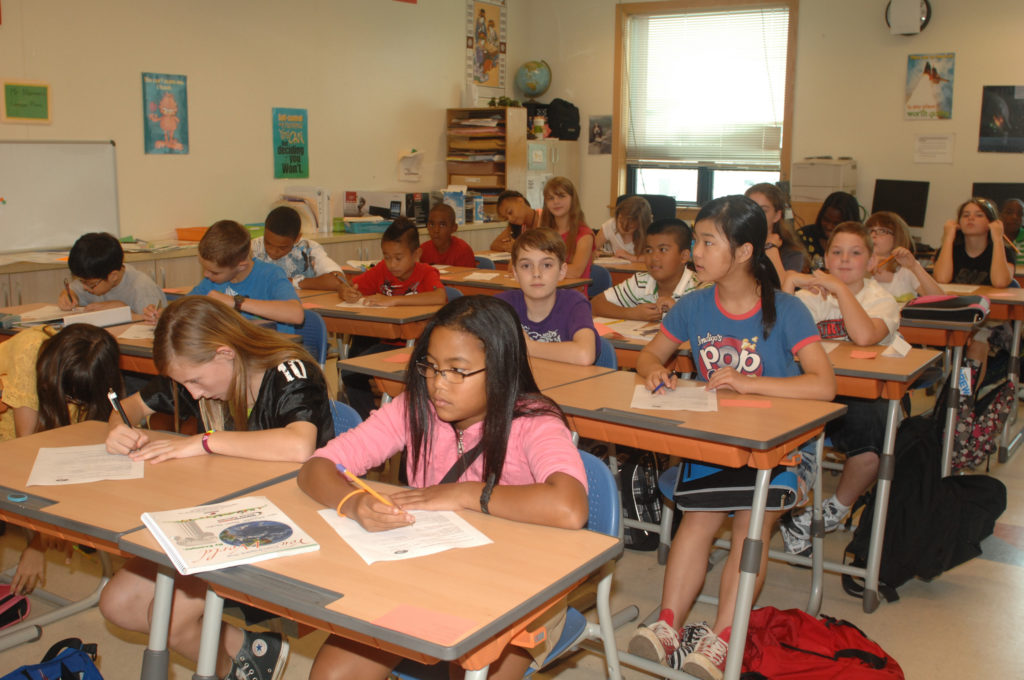In a recent meta-analysis of 82 school-based, social and emotional learning (SEL) interventions published in the journal Child Development, researchers found that student participants showed benefits to well-being 6 months after program participation.
Social and emotional learning, a teaching framework which has gained prominence in U.S. schools in recent years, focuses on developing five central cognitive, emotional and behavioral abilities. These five areas include the ability to understand and regulate one’s emotions (self-awareness), identify and attain goals (self-management), develop and demonstrate empathy (social awareness), have healthy social relationships (relationship skills) and make thoughtful decisions (responsible decision-making).
Proponents argue that in addition to helping student participants become more emotionally healthy humans and engaged citizens, social and emotional skill development enriches academic learning by enabling students to self-regulate, focus, and feel more comfortable in their classroom environment.

The Collaborative for Social and Emotional Learning (CASEL), an SEL advocacy organization which is home to two of the study’s co-authors, has developed relationships with school districts across the U.S. in the last several years. CASEL was co-founded in 1994 by famed emotional intelligence researcher Daniel Goleman. Districts that have partnered with CASEL include Chicago; Anchorage, Alaska; Oakland, California; and Austin, among others. There are now more than 1 million U.S. students in schools that use or plan to employ CASEL’s SEL approaches.
Prior studies have demonstrated links between social and emotional competency in childhood and positive “health, education, and well-being outcomes later in life.” A 2011 meta-analysis co-authored by three of the current study’s four researchers found that SEL interventions are successful in developing these competencies, as measured immediately post-intervention.
The researchers’ aim in the current study was to build on these findings by examining longer-term developmental outcomes of SEL programs. They also sought to investigate whether the long-term effects of such programs, which they expected to be positive, would be similar across racially and socioeconomically diverse populations.
To explore these questions, the researchers looked at longer-term outcomes (6 months to 18 years post-intervention) for student participants in SEL programs as compared to controls. They studied 82 school-based social and emotional learning programs with over 97,000 student participants in grades kindergarten through high school.
Their sample included schools in and outside the U.S. as well as schools with different racial and socioeconomic compositions (e.g. schools with predominantly students of color, white students, high/middle SES, low SES, mixed SES, etc.). They used Hedge’s g to calculate effect size (ES) on seven key outcomes: social and emotional skills, attitudes towards self, others and school, positive social behaviors, academic performance, conduct problems, emotional distress, and substance use.
Researchers found that participation in an SEL intervention translated to a positive lasting impact on students’ attitudes, positive social behavior, conduct problems, and emotional distress (5%, 5%, 5.6% and 5.6% improvement respectively) after follow-ups at 20 to 23 months. Perhaps most notably, they also found that SEL program participation corresponded to a 13% improvement in academic performance 3.5 years post-intervention, as compared to controls.
In support of one of their initial hypotheses, researchers found effects to be similar across race, socioeconomic status, and school location. However, they cautioned that these findings do not signal backing of a “one size fits all” approach – they maintain that it is still crucial for curriculum designers, educators and researchers to prioritize culturally-responsive programs.
The meta-analysis has several limitations, including the fact that three-fourths of the studies examined used self-report measures to evaluate outcomes; the inclusion of more studies with other measures, such as outside assessments and public record information, is recommended.
Additionally, the authors discuss the fact that many of the effect sizes calculated in the meta-analysis (for example .14 ES for conduct problems) would not be considered statistically significant in terms of Cohen’s effect size guidelines (.2 = small ES, .5 = medium ES, .8 = large ES). They contend that these guidelines do not apply to “universal promotion studies” and that they also are not pertinent to decoding follow-up data. Furthermore, they argue, though a .14 ES may seem small by Cohen’s standards, the corresponding real-life 5.6% reduction in conduct problems would doubtless be meaningful to educators, parents, and children.
It is worth noting that two of the study’s four co-authors, Rebecca Taylor and Roger P. Weissberg, are affiliated with CASEL, which has a clear interest in advancing research in support of social and emotional learning. Weissberg is also a professor at the University of Illinois at Chicago; the other two researchers, Eva Oberle and Joseph A. Durlak, are affiliated with the University of British Columbia and Loyola University Chicago respectively.
The World Health Organization’s 2004 report, Prevention of Mental Disorders, highlights SEL’s effectiveness in helping children cope with “family disruption,” and in reducing mental disorder diagnoses over time among children of divorce who participated in such interventions. Viewing Taylor et al.’s findings from this perspective, SEL may also be a preventative tool with the potential to help reduce the overdiagnosis and overtreatment of children.
****
Taylor, R. D., Oberle, E., Durlak, J. A. and Weissberg, R. P. (2017). Promoting positive youth development through school-based social and emotional learning interventions: A meta-analysis of follow-up effects. Child Development, 88(4), 1156–1171. doi:10.1111/cdev.12864 (Link)














